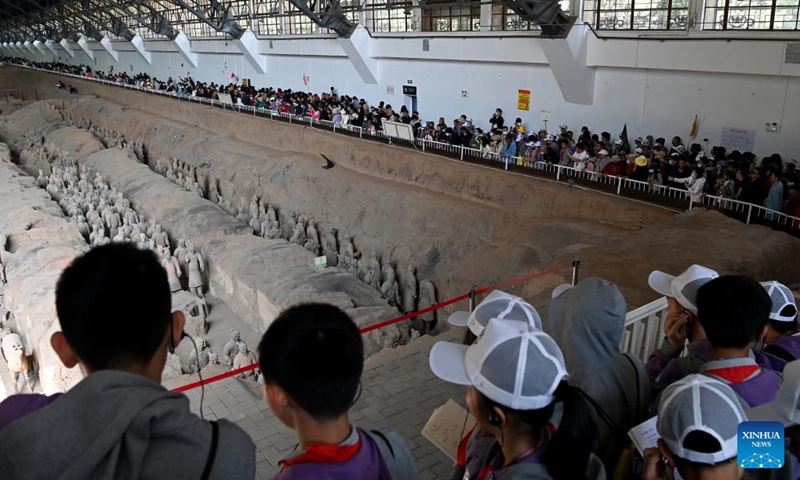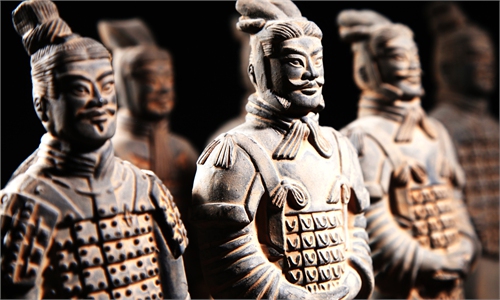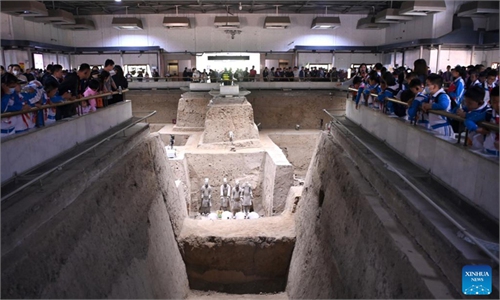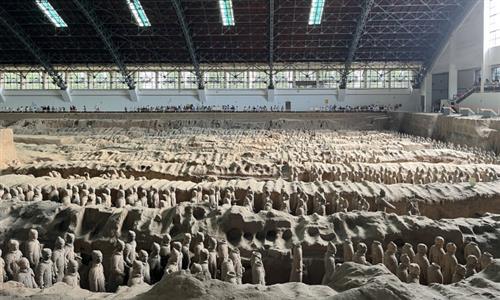ARTS / CULTURE & LEISURE
Emperor Qinshihuang museum launches online ticket platform for overseas tourists

People visit pit No.1 of the Emperor Qinshihuang's Mausoleum Site Museum in Xi'an, northwest China's Shaanxi Province, April 26, 2023. Xi'an, a city with over 3,100 years of history, served as the capital for 13 dynasties in Chinese history. It is also home to the world-renowned Terracotta warriors. (Photo: Xinhua)
Overseas tourists from 39 countries and regions around the world can now buy tickets for the Emperor Qinshihuang's Mausoleum Site Museum in Xi'an, Northwest China's Shaanxi Province, with their local currencies as a new online service platform has been launched by the museum, according to an official update released by the museum on Sunday.Since the platform's trial run in March, more than 2,000 foreign tourists have made reservations. The site provides services in 24 languages and accepts 29 currencies.
Qian Jikui, a deputy director of the Shaanxi Provincial Cultural Heritage Administration, told the Global Times that the online platform is of great importance for enhancing the influence of cultural relics in Shaanxi and promoting Chinese culture.
The museum has always been an icon of cultural exchanges in Shaanxi and China, and it is a well-known and desirable tourist destination for visitors worldwide. The service platform provides online experiences revolving around the Terracotta Army and facilitates online payments. It is an innovative measure and concrete attempt at improving the service capabilities of Shaanxi's cultural relics system, said Qian.
Luo Wenli, a deputy director of the National Cultural Heritage Administration, said that the move provides foreign tourists with a smarter and more efficient platform, which will play a leading role in promoting cultural exchanges between China and foreign countries.
Besides, the platform can provide examples for other museums to follow and museums are encouraged to explore new ways to optimize the services to promote exchanges and mutual learning among civilizations, Luo said.
In 2023, the museum, which houses the globally acclaimed Terracotta Warriors, welcomed more than 11.2 million visitors, marking its highest annual attendance to date.
Since 2023, China's inbound tourism market has gradually rebounded. According to a press conference held by the Ministry of Culture and Tourism (MCT) on March 29, during the first two months of 2024, China documented 2.95 million arrivals and departures involving foreign nationals, marking a significant surge of 2.3 times compared with the preceding period thanks to a series of visa-free policies. This figure corresponds to 41.5 percent of pre-COVID-19 pandemic levels.
But the travel experience of inbound tourists has been hampered by issues such as difficulties in consumer payments, inconvenient foreign currency exchange and cumbersome departure tax refunds.
The ministry will step up its efforts to optimize inbound payments and upgrade payment facilities for cultural and tourism locations such as tourist attractions, resorts, and star-rated hotels, according to the press conference.
To better serve foreign tourists' credit card use, more POS machines will be set up in scenic spots, hotels and other consumption areas. Many star-rated hotels in Shanghai have upgraded their POS machines, while Beijing is also accelerating POS machine upgrades, Shi Zeyi, an official with the MCT, said.
Foreign currency exchange service kiosks will be set up at national tourist resorts and attractions to provide foreign currency and banknote exchange services to meet the needs of inbound tourists, Shi said.



